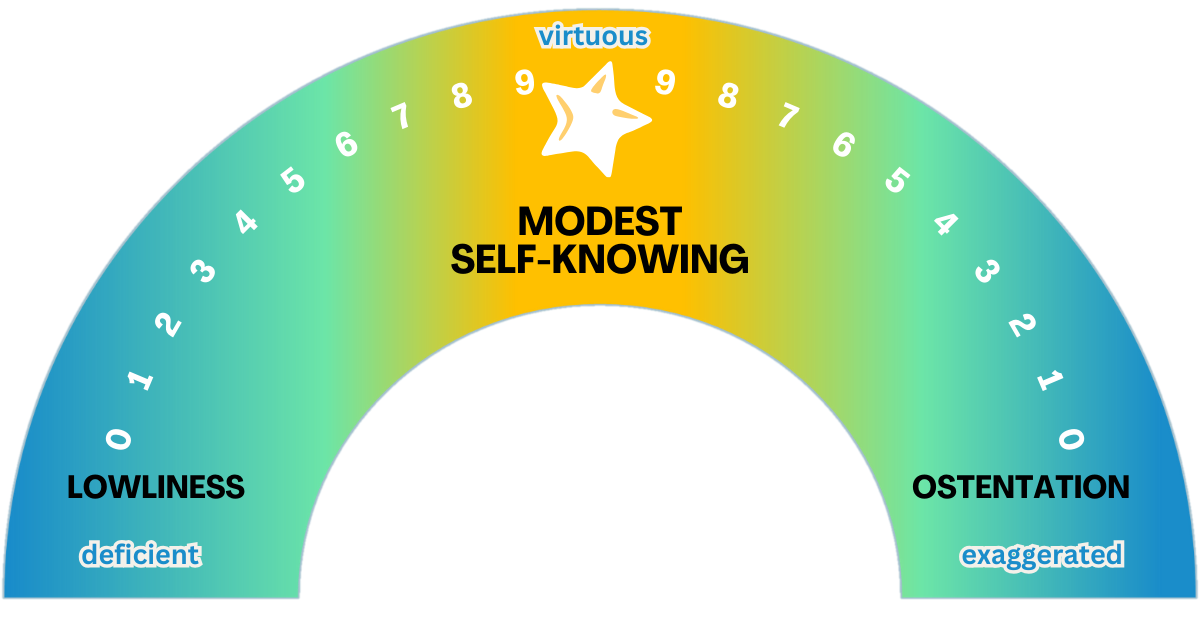In the tapestry of human interactions, the desire to be noticed or recognized plays a significant role, shaping our behavior. Each person navigates this desire differently, influenced by their character traits and attitudes. In this section, we’ll explore the character traits and attitudes that define our approach to being noticed.
The Continuum
Along the continuum of being noticed, individuals can fall at various points. On one extreme is lowliness, characterized by a lack of self-confidence or self-worth leading to a reluctance to assert oneself or seek attention. On the other extreme is ostentation, marked by excessive or pretentious display intended to impress others. The virtuous path lies in the center, where individuals maintain a modest self-awareness, acknowledging their worth without seeking excessive attention or validation from others.
People may find themselves at various positions on this continuum. To make things even more complex, some may shift their position based on the circumstance. For instance, while they may act with lowliness in certain situations, such as downplaying their achievements or avoiding the spotlight, they may exhibit ostentatious behavior in other areas, such as flaunting material possessions or seeking constant validation on social media platforms.
Lowliness: On one end of the spectrum, there are individuals who shy away from attention, withdrawing from social interactions and preferring solitude to avoid drawing notice.
Preferring Inconspicuousness: As we progress along, there are people who prefer to blend in, not actively engaging in social settings and choosing to remain inconspicuous.
Modest Self-Knowing: Moving further, there are those who know their worth and are comfortable with moderate attention but don’t actively seek it.
Craving Recognition: Continuing, some engage in self-promotion, craving affirmation from peers or authority figures.
Ostentation: Finally, at the far end, are those who are ostentatious, displaying their wealth, status, or achievements flamboyantly, constantly craving validation and resorting to attention-seeking behavior to maintain visibility at any cost.
Benefits of Modest Self-Knowing
When we cultivate a balanced sense of being noticed, embracing modest self-knowing between lowliness and ostentation, we foster authentic connections and genuine recognition from others. This balance allows us to navigate social interactions with humility and sincerity, leading to meaningful relationships and a deeper sense of belonging.
Here are some benefits:
Grounded: Modesty helps in keeping a grounded perspective on oneself and one’s achievements, fostering humility.
Authentic Connections: Modest individuals often attract genuine relationships as they are perceived as approachable and unassuming.
Less Stress: There’s less pressure to maintain a certain image or status when living modestly, leading to reduced stress levels.
Focus on Substance: Modesty shifts the focus from external appearances or material possessions to inner qualities and genuine contributions, promoting a focus on substance rather than superficiality.
Respect from Others: Modest behavior often earns respect from others, as it demonstrates a lack of arrogance and a willingness to share the spotlight with others.
Increased Learning and Growth: Modest individuals are often open to learning from others and admitting their mistakes, which can lead to personal growth and development.
Cultivating Gratitude: Living modestly encourages gratitude for what one has, rather than constantly seeking more or comparing oneself to others.
Enhanced Self-Acceptance: Embracing modesty can lead to greater self-acceptance, as one learns to appreciate oneself without needing constant external validation.



